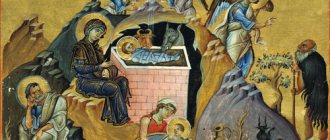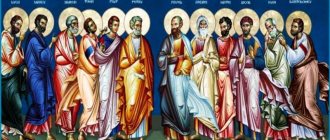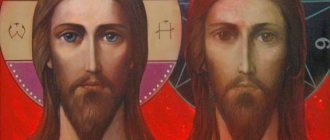The land in which the events related to the topic of our lesson today took place is called Palestine. It was inhabited by the Jewish people, who were divided into 12 tribes. In the 6th century BC. e. Palestine was captured by the Babylonians, and the Jews were resettled in Babylon. Many years later they were freed by the Persian king Cyrus. He allowed them to return, but since there was very little fertile land in Palestine, many chose not to return. Thus, the first diaspora arose. Subsequently, after the conquest of Alexander the Great, Jews settled throughout the Hellenistic world.
Synagogues
The centers of Jewish communities were synagogues, where Jews gathered for prayers on Saturdays. They were separated from the rest of the pagan world by their reluctance to worship pagan gods and their belief in their one god, the creator of the entire world around them. These features attracted the attention of the pagans. Someone accused the Jews of godlessness, and someone who was more educated and familiar with the works of Greek philosophers said that the Jews are a people of philosophers. The fact is that by that time the Greeks also came to the idea that there is not a set of gods, but a single god.
The emergence of Christianity
In the 1st century BC. e. in the Roman Empire, the fashion for all sorts of exotic oriental religions would spread. In particular, adherents of Judaism will appear. It is in this environment that the newly emerging religion - Christianity - will spread.
In the 1st century BC. e. The Romans captured a small independent country - Judea. The cruel king Herod began to rule it. The cruel king Herod ruled Judea under the Roman emperor Augustus. When Herod died, the Romans disposed of the conquered territories as follows: Galilee came under the rule of Herod’s son, Herod Antipas, and Judea began to be ruled by Roman governors, who were called prefects, and later, procurators. The internal affairs of the Jews were handled by a council - the Sanhedrin, which consisted of priests and champions of antiquity. They were called Pharisees.
Transcript of How Christians Appeared
Contents of the first lecture from the course “History of Orthodox Culture”
Christianity, one of the world's largest religions, originated more than 2,000 years ago in Judea. This is a historical religion, that is, based on faith in specific events described in books called the Gospel. These four books (more precisely, four editions of the same book, the name of which is translated from Greek literally as “gospel” or “good news”) tell about the birth, life, death and miraculous resurrection of Jesus Christ. In Russian - Anointed, Messiah, Tsar, since anointing is precisely a royal epithet. “Jesus the King” - that’s how it sounded in Greek and Latin.
Actually, the news of the resurrection of Christ is the most important “good news”, the good news that was told by the first Christians, the so-called apostles - messengers sent by the already risen Jesus to all nations for baptism and teaching. The Resurrection of Christ serves as the main guarantor of the fidelity of the path He indicated, the goal of which is to overcome death and achieve a certain special blissful state, which is usually called “the life of the next century.”
Many religions and philosophical schools taught that death is not the end of human existence, but the uniqueness of Christianity is manifested in the fact that it speaks not just about the immortality of the soul, but also assumes the resurrection of the body, which was a kind of revolution in philosophical consciousness. In itself, bodily resurrection does not mean further bliss, because the resurrection will happen to absolutely everyone, but not everyone will be awarded the right to continue life with God in the Kingdom of Heaven. Jesus will personally take them there through the Last Judgment after the Second Coming. The purpose of the Last Judgment will not be to punish the unworthy, but to select them, to cull them. After all, this is the main problem of the current world, this century, that man is far from perfect, he does a lot of stupid, evil, unworthy of the divine image in which he was created at the beginning of creation.
Both the essence and stages of this human degradation are figuratively described in the first book of the Old Testament - the Book of Genesis, where Adam and Eve not only disobeyed God, but tried to shift the blame onto another, for which they lost their beautiful paradise life. The son of Adam and Eve, Cain, out of envy, killed his own brother and again lied to God: “Am I my brother’s keeper?” “And the Lord said to Cain: Where is Abel your brother? He said: I don’t know; Am I my brother’s keeper?” (Gen. 4:9) - that is, he pretended that he had nothing to do with it at all. In short, humanity went downhill, so much so that at one point it even had to radically reduce the number of people during the Great Flood.
Not wanting to force people to correct themselves, since man was created free, God kept sending people hints. But neither the obedience of Abraham, nor the laws given to Moses, nor the founding of the kingdom of Israel and the construction of the Temple in Jerusalem - none of this helped radically correct the situation. Israel - the people chosen by God to correct all mankind - continually fell into error, was carried away by pagan religions, and in the end generally replaced righteousness, that is, sincere love for God and the desire for perfection, with a simple formal system of observing rituals - something that in the New Testament it is described through the concept of Pharisaism. The prophets tirelessly denounced Israel, but also encouraged them with the coming of the true King, who would establish the worldwide dominion of God's chosen people.
A difficult time has come for all Jews, which is usually called the expectation of the Messiah. Around the political events that were taking place at that time, there were a lot of religious aspirations of the Jewish people. The fact is that the religion, which is based on the Pentateuch of Moses and the founder of which in the full sense of the word can be called Abraham, teaches that at the end of time, when the Jews will endure very severe humiliation at the hands of the pagans, the Messiah will appear. He will save Israel and restore its greatness, its power. And the expectations of the Messiah are based to a large extent on the Book of the Prophet Daniel, where the approximate date for when this event would occur was indicated: seventy weeks, that is, 490 years, after the restoration of destroyed Jerusalem, and this happened in the middle of the 5th century BC. e. under Artaxerxes I.
And at the beginning of the century, which we consider the 1st century AD. e., seventy weeks were expiring, and everyone was awaiting the arrival of this mysterious, mystical King with horror and hope. By this time, only one tribe, Judah, and several other remains of other tribes had survived from ancient Israel in Judea. But it was the Kingdom of Judah at that time that expressed Israel and its aspirations, but at that time it was going through difficult times and was declining. The fact is that King Herod, who was an Edomite, sat on the throne of the Kingdom of Judah. According to the Bible (Genesis 27), the Edomites (Edomites) are considered the descendants of Esau (brother of Jacob and uncle of Judah), nicknamed Edom. by origin, and after his death, Judea was generally split and subordinated to the powerful Roman Empire. And it would have been difficult to find less suitable conditions for establishing the rule of Israel, but all the Jews were waiting for a miracle and preparing for the onset of the decisive battle between good and evil.
Many went into the desert for this; people gathered in droves around wandering preachers and teachers. Concerned official religious leaders led by the high priest and local kings subordinate to Rome tried to control the situation by getting rid of the most popular popular leaders. One of the representatives of this type of itinerant preachers, very popular among the common people of Israel, was John the Baptist. After the execution of John the Baptist, almost unnoticed, a small group emerged from among his followers (who believed that in order for Israel to regain power, it was necessary to be cleansed from sins and crimes, the symbol of which was baptism - washing in the waters of the Jordan River). led by Jesus, son of Joseph, a resident of the city of Nazareth in Galilee.
Galilee was a fairly remote wilderness area in Israel: it was a mountainous province famous primarily for its bandits. But soon Jesus of Nazareth made all of Jerusalem talk about himself. His unusual abilities (primarily the gift of healing) attracted more and more people, his sermons attracted thousands of listeners. And when Jesus came to Jerusalem for Easter, whole crowds of followers gathered around him.
It must be said that Jesus’ sermon was, according to the custom of prophetic utterances, quite difficult to understand. These were parables, allegorical stories filled with many levels of meaning and encrypted with mysterious codes. The listeners did not understand everything in Jesus' sermons. Many are poorly understood by us even now, after many centuries of interpretation and clarification. But still, the basis of the new teaching, formulated in the Sermon on the Mount, is the key sermon of Christ on a hill on the shore of Lake Gennesaret, during which the disciples were given the Commandments of beatitude, that is, happiness: blessed are the humble, the weeping, the meek, the merciful, the pure in heart, and so on further., is extremely clear. In fact, this is an expanded and strengthened version of the famous commandments of Moses, where the bar is set even higher: not only do not kill, but also do not be angry; not only do not commit adultery, but do not even look at a woman with lust; don't just help people, but do it secretly; do not just love your neighbor, but also love those who are far away, not only your friend, but also those who hate you. Thus, it turns out that those commandments, those life principles that Jesus establishes for his followers, turn out to be very difficult to fulfill. And, in fact, the people of that time perceived them as commandments of the last times, that is, commandments that are impossible to fulfill in ordinary life. But since the appearance of the Messiah was also associated in the ideas of that time with some kind of cosmic events, with a certain end of times, such spiritual tension seemed, in principle, quite possible.
And true happiness, true bliss in Christianity belong not to those on whom fate smiles, but to people who in ordinary society are by no means considered lucky: the poor, the weeping, the meek, the truth-seekers, the merciful, the peacemakers. And the most important thing is that the followers of Christ themselves, through His preaching, are prepared for the fact that they will be reviled and persecuted. Such a maximalist and seemingly asocial program (a kind of challenge to society and prevailing mores, moral values) turned out to be surprisingly in demand at that time. And not only many of the Jews, but even the so-called pagans (that is, simply put, foreigners, people of other faiths, primarily Greeks with a philosophical education, highly developed people), having learned about such an ethical program, about such a big not just religious, but also social project, saw in it a saving path in order to pull the world out of the whirlpool of problems in which it found itself at the turn of two eras.
But we must not forget that Christianity is not just a doctrine, but also a religion, that is, a belief in the divinity of Christ as the Son of God. Here it should be said that for a devout Jew there was no more intolerable blasphemy than to assert that the one and omnipotent Creator, the invisible omnipotent God, can have a son and send him to earth. Usually the pagans, the Greeks, liked to spread this kind of fantasy: it was their mythical gods who continually descended from Olympus, took on human form and even gave birth to demigod children. And in the times of Hellenism, that is, after Alexander the Great, Hellenistic monarchs and Roman emperors often tried on this divine entourage and, starting with Alexander himself, imagined themselves either as sons of gods, or even simply as gods. So, for example, the emperor Augustus, whom the Romans deified and called in Latin with the still rather modest epithet divus (“divine”), like his father, is already called simply god in Greek, and we see on the epigraphy of Augustus - “God, God's Son". And such cynicism of religious veneration for politicians, brought to the point of deification of groveling before the rulers of this world, was deeply alien to the Jewish religion with its strict, rigid monotheism and deep contempt for politics in general, especially for pagan and Roman politics. A devout Jew could call God father, but only in a figurative sense - as the Creator of the entire human race. Nevertheless, Jesus of Nazareth went further in his preaching. He, of course, did not directly call himself God, but here are his words from the Gospels: “He who has seen Me has seen the Father,” “I and the Father are one,” “The Father is in Me, and I in Him.” And when to the question “Who do you say that I am?” addressed to the disciples, Simon Peter answered: “You are the Christ, the Son of the living God,” Jesus said: “Flesh and blood did not reveal this to you, but My Father who is in heaven " For the Jews, especially those rooted in tradition - the scribes, the Pharisees - this was too much. Zealots for the purity of doctrine and religious official authorities began a hunt for the preacher.
Meanwhile, the glory of Jesus grew by leaps and bounds, and on the eve of the next Passover - the date of which is still controversial: it is either 30 or 33 - at a time when all of Judea, young and old, flocked to Jerusalem, Jesus made me talk about myself again. Firstly, on Saturday a week before Easter, he is rumored to have raised Lazarus from Bethany, who had died a few days earlier. On Monday, he carried out a real destruction on the territory of the Jerusalem Temple, dispersing with whips the traders who had settled there on the eve of the holiday. At this moment, the cup of patience overflowed, and on Wednesday at the council of the high priest it was decided to eliminate the preacher who had become dangerous. On Thursday evening, Jesus was captured, betrayed by one of his disciples, Judas, and on Friday executed: according to Jewish laws - for blasphemy, according to Roman laws - for rebellion and declaring himself King. They remembered that he was called anointed, that is, king, and the jealous emperor Tiberius did not like rebels very much, so the Roman governor of Judea, Pontius Pilate, who was about to release the preacher who seemed completely innocent to him, found himself in a very difficult situation: when he hesitated, the Jews gently hinted to him , that Caesar’s friends do not do this and that “we have no other king but Caesar.” Pilate tried to give the right to release Jesus to the Jews themselves, since such a tradition existed on the Passover holiday, but the Jewish people preferred to release the thief, and about Jesus they shouted: “Crucify, crucify him!” Thus, Jesus Christ, who came to Israel as its King, was rejected by Israel, but, surprisingly, his teachings were accepted outside of Judea, in the Hellenistic world.
The preaching of the Gospel (the good news of the resurrection of Christ, which occurred on the third day after his crucifixion) quickly swept across the entire Roman East, and then the entire Roman Empire. And the Hellenistic culture turned out to be the ideal soil for such spread.
It’s worth saying a few words about this phenomenon. The fact is that Hellenism is a phenomenon that is politically associated with the empire, with the power of Alexander the Great and his heirs, the states of the Diadochi. The Diadochi are the generals of Alexander the Great, who, after his death in 323 BC. e. as a result of long wars they divided the empire among themselves. - in a cultural sense, extends to Roman times, the so-called late Antiquity. What is the phenomenon of Hellenism? This is the first mass culture in the history of mankind, the main elements of which are universal education, school, science, and literacy. This is primarily a culture associated with written texts.
As Hellenism developed and penetrated beyond the Greek world proper (and it penetrated into vast spaces - from Gibraltar to the Pamirs and India), the Greek language, the Greek alphabet and the very passion for literature and books spread throughout this entire territory. But this entire colossal school and scientific system, this entire cultural technology was based on very archaic texts that can be traced through the poems of Homer to the ancient Greek mythological tales of the Olympian gods. And just in the era of late Antiquity, there was a huge demand to fill the gap of meanings, so that this knowledge itself, the meanings themselves, that is, the truth, could be placed into a system that perfectly knew how to disseminate knowledge. And philosophical schools, of which there were quite a few in the Hellenistic world, each offered this truth. This led to agnosticism, the idea that truth as such is a relative thing, that it is different for everyone. Pilate's famous question to Christ, “What is truth?” This is exactly what shows us such a person from the ancient world - highly cultured, but who lost faith in the possibility of comprehending true knowledge, the truth about the world. It was precisely this request that turned out to be in amazing conjunction with the preaching of the Gospel.
The Gospel, or, in Greek, “good news,” is what the apostles told in all the countries where they went to preach, talking about the resurrection of Christ and His commandments. And, in fact, the good news was that the truth exists, that already in many religious schools and philosophical systems the postulated immortality of the human soul is not some distant and rather abstract ideas, but is completely provable and, moreover, not a phenomenon spreading only to the soul, but also to the body. That is, the resurrection of Christ demonstrates, as a historical event, the truth of human immortality, what both ancient religions and all philosophical schools strived for - the acquisition of true life throughout the ages, a life that is not affected by the shortcomings, illnesses and imperfections of this world. But to gain this life, the life of the next century, according to Christian teaching, very serious inner work is necessary.
The apostles sent their steps not only to Greece and Rome, but also to Egypt, Syria, Armenia, Georgia, Persia, India, and by the 3rd century, Christianity could, without exaggeration, be called one of the most popular religions of the entire ecumene, as the cultural space was then called. The Roman state immediately accepted Christianity with hostility. The Romans had little interest in the traditions of the conquered peoples and pursued a fairly tolerant religious policy, but Christian communities were more like public associations than religious unions, and here early imperial legislation was inexorable. Christianity was perceived as a socially dangerous phenomenon, especially since Christians gathered in secret, at night, in the catacombs, among the graves, and through closed doors, vague cries about mutual love, about tasting the Body and Blood reached random listeners, and the wild imagination of the Roman inhabitants willingly completed the heartbreaking a picture of bloody orgies. But most importantly, Christians refused to honor the emperor.
The cult of the emperor was the core of the Roman state system, and Christians - although they respected authorities at all levels, observed civil laws and were, one might say, exemplary citizens - could not be forced by any torture to show religious worship to the emperor, to make sacrifices to him as a certain divine genius. And it must be said that the Jews, as representatives of an ancient religion, enjoyed the privilege of not performing religious worship of the emperor, but since Christians could not refer to the antiquity of their tradition, the Romans forbade them to practice their faith, forbade their worship and, moreover, subjected them to persecution .
There were two main waves of persecution. One is associated with the name of Emperor Decius, a strict rigorist, a former censor, who set out to eradicate Christianity at its roots and, for this purpose, organized a real audit of the entire population of the empire. Every single one, including women and young people, had to bring certificates of performing sacred rites in honor of the emperor; Those who refused faced the death penalty. At the same time, the emperor’s philanthropy prescribed to try by all means to save the lives of Roman citizens, which led to the spread of the most savage torture, as they tried to reason with Christians and bring them to obedience, to obedience to the main imperial virtue. The effect of the persecution was unexpected: Christians went to execution in droves and amazed the executioners and spectators with their steadfastness. Moreover, Decius himself ended quite badly: in one of the military campaigns he simply drowned in the Danube swamps.
Valerian, who continued his work, was generally captured, which was even more humiliating for the Roman emperor. This is the first emperor in history who was captured alive by the Persians and served the Shahinshah until the end of his days, putting him on a horse. That is, the persecution of Christians did not cause obvious joy among the Olympian gods; Jupiter and Victoria did not favor the Romans any more because of this. But the attitude towards Christians on the part of ordinary citizens changed dramatically, since everyone viewed persistent endurance of torture in much the same way as they consider the behavior of witnesses in court: if a person testifies under torture, then the testimony is true. And it is no coincidence that in Greek the ancient martyrs of the Christian faith are called “martiros” - witnesses. And they testified precisely to the truth of their faith.
The time from the captivity of Emperor Valerian to the next, last great persecution, which began under Diocletian (second half of the 3rd century), can be called the era of the real boom of Christianity. The persecution subsided, some emperors even revered Christ - however, not as God, but as a wise philosopher; Traders, artisans, scientists, lawyers, military and civil officials became Christians; it penetrated into the palace.
By the beginning of the 4th century, there were so many Christians in the empire, and their position in the army and state - in the elite of society - turned out to be so influential that Diocletian’s co-ruler, Caesar Galerius, persuaded him to begin persecution and “cleanse” the empire of this “dangerous infection.” The result was the most severe mass persecution, the so-called Great Persecution of Diocletian, which affected mainly the eastern provinces, but also penetrated into the western ones. Many thousands of martyrs died. But the persecution fizzled out. Church historian Eusebius of Caesarea, a contemporary of these events, writes that the authorities themselves were forced to undergo persecution, since many governors, mayors, and military officers themselves turned out to be Christians, and these cruel measures did not help restore order in the empire. And the initiator of the persecution, Galerius himself, fell mortally ill, fell ill, struck by a certain form of gangrene, and on his deathbed he allowed Christians to be Christians by his edict. That’s exactly what it says: “Let there be Christians.” And in 311, after three centuries of illegal existence on the territory of the Roman Empire, Christianity finally became a permitted religion - religio licita. And a year later, Galerius’ successor Flavius Valerius Constantine (August, whom we know as Emperor Constantine the Great) himself converted to Christianity and, with his edict issued in 313 in Milan, declared complete religious freedom in the empire, which in the conditions of that time meant nothing no less than one thing - the victory of Christian teaching over the Roman state, over pagan religions, and opened a new era in the history of not only the Roman Empire, but also in the history of the entire European, and perhaps world civilization, the era of Christianity.
Who told about the birth of Christ
For us, the birth of Christ divided all history into two parts - before the Nativity of Christ and after the Nativity of Christ. Four evangelists told us about the birth, life, death, and resurrection of Christ: Matthew, Mark, Luke, and John. Believers religiously believe every word that has come down to us in the New Testament.
Insofar as they see the greatest feat in the life, death and resurrection of Christ. He is the one who gave people eternal life. Before following Christ, Matthew was a publican, collecting taxes for Rome. As for Mark, he joined the Christian community when he was still at a very young age. He will write his gospel based on the memoirs of the Apostle Peter. As for Luke, he was a doctor and painter from Antioch. Subsequently, he will be recognized as the first icon painter. John, before following Jesus, was a fisherman.
Birth of Jesus Christ
What did the evangelists talk about? During the census organized by the Roman authorities, a couple went from Nazareth to Bethlehem. It was Joseph and Mary. Mary was expecting the birth of a baby. She was predicted that the baby she would give birth to would become the savior of the world. When the couple reached Bethlehem, it turned out that they had nowhere to stay. I had to spend the night in a den, in a cave. There the baby Jesus was born. His birth was accompanied by a strange phenomenon - a bright star rose in the east and this star showed the way to three shepherds and three wise men, who brought their gifts to the born one.
By the age of thirty, Jesus would be baptized by John the Baptist. He will travel a lot, preach, work miracles. He will be followed everywhere by 12 disciples - the apostles, those who will subsequently spread his teachings to all ends of the earth. What did Christ teach? Things that are very complex and very simple. Do not repay evil for evil, do not offend others, and then through faith, through love for God, the gates of the kingdom of heaven will open for a person.
Execution of Christ
A week before the Jewish holiday of Passover, Jesus Christ and his disciples arrived in the city of Jerusalem. He was greeted enthusiastically, however, his opponents were unhappy. They saw Jesus as just one of many impostors. Another man who claims to be the son of God. As a result, one of Christ’s disciples, Judas, was bribed. He betrayed him.
Jesus was captured and executed by the verdict of the Sanhedrin. This sentence was approved by Pontius Pilate, the Roman governor. After the execution took place, one of the most terrible and shameful executions, the body was given to the disciples of Christ. They put him in a cave, not far from Golgotha, the mountain where the execution took place. When on the third day the followers of Christ came to anoint the body with fragrant oils and bury it, it turned out that the stone that had previously covered the entrance to the cave had been rolled away, and an angel was sitting in the place where the body had once lay. The angel told them that Christ had risen.
Jesus Christ appeared to his disciples for another 40 days, until he ascended to heaven, entering the Mount of Olives. Some believe what the evangelists say literally to the last word, while others are critical. But in any case, few doubt the fact of the existence of Jesus, called Christ.
It is impossible to say who was the first to accept Orthodoxy.
The history of Orthodoxy is also not clear-cut. From the point of view of an Orthodox person, only he is a devoted follower of the original tradition. Accordingly, Orthodox people are the first Christians, and Catholics and Protestants are those who moved away from them.
M. Nesterov. "Saint Olga", 1892
This word has been found in Christian writings since the 2nd century. But we can say for sure who was the first to accept Orthodoxy in Rus'. According to some, not the most reliable sources, the first Christians in our country could have been the princes Askold and Dir with a certain number of people in 860–867. But the history of Russian Orthodoxy itself began only a century later, when the baptism of Rus' took place.
The first Russian ruler to convert to Orthodoxy was Princess Olga (957).
By leaving a comment, you accept the user agreement
Disciples of Jesus Christ
What happened to the students next? Left without their teacher, they were not abandoned. According to legend, the Holy Spirit descended on them, after which, under the pressure of persecution and, in fact, wanting to preach the faith of Christ, they spread to the most remote corners of the earth.
Among Christ's disciples there were many talented preachers. And one of the most talented was the Apostle Paul. During the life of Christ, Paul was not his disciple; moreover, he belonged to the persecutors of Christians. But one day Christ appeared to him and rebuked him. And Paul left everything and went to preach. He is called the apostle of the pagans. The fact is that in his travels he visited Macedonia, Greece, and Asia Minor, and everywhere his sermons were a huge success.
The essence of Christianity in early times is the message of the fulfillment of Jewish prophecy
The history of the Christian church is closely connected with Judaism. Judge for yourself: the birthplace of Christianity is Palestine, its ancient texts are the Old Testament.
Since the time of Moses, prophets have looked into the future and reported that a Redeemer, a Messiah, a certain King of humanity was coming, who would save everyone.
Jesus Christ was not the founder of Christianity, he led the life of a pious Jew
That’s why the Jews were waiting for a king—an ordinary, earthly one. In that era, many impostors appeared trying to attract attention to themselves. But their views and sermons touched the hearts of few. The main teachings, or rather different views on the single core of the Jewish tradition, still prevailed:
- Pharisees are traditionalists, the elite of society;
- Sadducees - reformers, representatives of the lower strata;
- The Essenes are monks who have distanced themselves from the worldly.
Among the influential prophets of the first years of our era can be called John the Baptist. Most likely, based on his views and biography, this man came from the Essenes. This is not yet the founder of Christianity, but the one who will introduce the communal way of life and provide the first audience for Jesus Christ.
the closest predecessor of Jesus Christ, who predicted the coming of the Messiah
Moreover, from the episode of the expulsion of merchants from the temple, we see that Jesus Christ defends the Jewish tradition and clearly values it. So by religion, both Jesus Christ and John the Baptist were Jews, not Christians.
How Christianity Spread
First, Christianity spread throughout the Roman Empire, then from beyond its borders. The growth in the number of Christians attracted the attention of the Roman emperors. Persecution followed. Under Nero, these persecutions were truly terrible. Those who did not renounce were thrown to the beasts and burned alive. Those who did not renounce Christ, but chose death, were later called martyrs.
Under Emperor Diocletian, there was an attempt to solve the problem with Christians radically. Diocletian simply tried to destroy them physically. It didn't work out for him. But in 313, Emperor Constantine, on the contrary, gave Christians the opportunity to freely practice their religion. Moreover, he was even baptized himself. Thus, Christianity became the state religion. The path that the Christian church has traversed is very difficult, tortuous and eventful. The Christian Church survived. It has survived, survived and is, perhaps, one of the few institutions that go back in its development to ancient times.
The basic teachings and ideas of the first Christians have almost never reached us
We know little about the basic teachings of the early Christians due to a lack of sources. They were probably very close to the Judaism of that time, especially to the views of the Essenes.
In slightly later centuries, two main directions emerged:
- Christianity familiar to us . With some amendments, it was this teaching that ultimately provided the basis for the main currents of today's Christianity. It cannot be said that it was a single religion. On the contrary, there were many schools (Antiochene, Roman, etc.).
- Gnostic Christianity . This is a mystical view of Christianity. It focuses on esotericism, which makes these movements similar to Kabbalah. The dawn of this tradition occurred in the 2nd–4th centuries, but even today there are groups of believers who, to one degree or another, inherit these views.
And yet we can say that the main ideas in the traditions overlapped:
- The main Scripture remained the Old Testament (not always) and New Testament texts, but the composition of these canons differed in traditions. There were many apocrypha;
- Christ has always been considered the central figure of religion, although His role has been assessed in different ways.
It is impossible to identify other common features. Some recognized the Old Testament God, others rejected. For some, Jesus is the Messiah, for others he is just a man, etc. The ritual part not only varied, but was also rejected by some traditions.
In general, Christianity quickly became a diverse tradition, which has echoes to this day.







